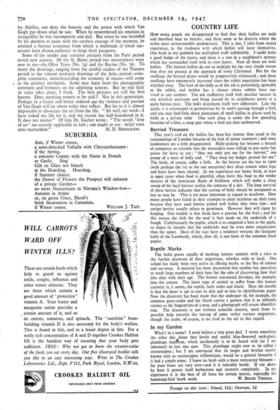Berried Treasure This year's raid on the hollies has been
less intense than usual in the surroundings of London because of the lack of motor transport ; and some landowners are a little disappointed. Holly-picking has become a branch of commerce so valuable that the marauders were willing to pay quite fair prices for leave to cut ; " they not only pay me for the harvest," one owner of a mass of holly said. " They keep my hedges pruned for me." The birds, of course, suffer a little. As the berries are the last to ripen (with perhaps the ivy as the one exception) they often remain when hips and haws have been cleared. In my experience our home birds, at least in open years when food is plentiful, often leave this food to the tender mercies of the immigrant flocks of fieldfares which will make a clean sweep of the local harvest within the compass of a day. The long survival of these berries indicates that the sowing of holly should be postponed as late as may be. This is yet more important in regard to mistletoe. How many people have failed in their attempts to plant mistletoe on their trees because they have used berries picked well before they were ripe ; and unripe berries usually refuse to germinate. However they will ripen by keeping. One trouble is that birds have a passion for the fruit ; and for this reason the cleft for the seed is best made on the underside of a bough. Unfortunately the poplar, which is as congenial a host as the apple, so slopes its boughs that the underside may be even more conspicuous than the upper. Most of the race have a tendency towards the fastigiate habit of the Lombardy, which, after all, is one form of the common black poplar.


































 Previous page
Previous page